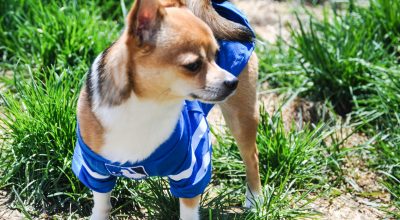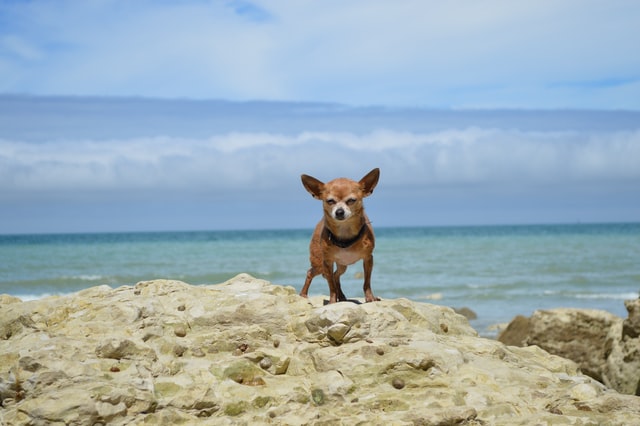
If you see your Chihuahua licking, itching, or chewing themselves excessively, they may be allergic. Allergies are defined as an excessive immune reaction to one or more foreign substances.
When a foreign substance to which a Chihuahua is allergic enters its body or comes into direct touch with its skin, the Chihuahua’s immune system responds by generating an excess of antibodies, resulting in an allergic response.
Food allergies are thought to account for almost 10% of all allergies in Chihuahuas and all dogs. However, there are other types of allergies that a Chi might have, so it is better to get the main problem examined as soon as possible.
What Are Chihuahuas Allergic To?

❕ Skin Allergies
Food allergies and contact allergies, such as flea dermatitis, can cause skin allergies. In most cases of Chihuahua skin allergies, your pet will have itchy skin, red hot patches, and even pus-filled blisters. In addition, scabs may form, and the skin may become red and irritated.
If your Chihuahua has both food and skin allergies, they may be itchy and have a dull coat.
Fleas can also induce skin allergies in your Chi; however, in this case, you may notice the fleas and their tiny black detritus on your Chi’s skin. Other insect bites, such as bee stings, might trigger severe allergic reactions in your cat.
❕ Food Allergies
It is crucial to consult with your trusted veterinarian to establish whether your Chihuahua has a food allergy. This is because food allergy is frequently mistaken for food sensitivity.
Many Chihuahuas suffer from food intolerance or sensitivity rather than food allergy. Food allergies are distinguished by an acute immunological reaction, such as swelling of the face, breaking out in hives, or, in severe cases, falling into anaphylactic shock.
On the other hand, food intolerance or sensitivity is not as dangerous but can cause symptoms that have a significant influence on your Chihuahua’s quality of life.
❕ Environmental Allergies
The most frequent allergens that might cause an allergic response in Chihuahuas include dust, pollen, and mold. These allergies are mainly picked up by your pet’s paws when they wander through grass or dirt.
Also, different seasons may cause your Chi to itch more. Harsh home cleansers and air fresheners can also cause allergies. Secondary infections, such as pus-filled blisters and bacterial infections, are possible and may need antibiotic therapy.
Allergy Testing for Your Dog (Chihuahua)
Dog allergy testing is partially determined by your dog’s symptoms and what your veterinarian believes is causing her problems.
👍Skin Intradermal Testing
It entails administering tiny injections of a variety of allergies and monitoring your dog’s reactions. This information is then utilized to develop a personalized allergy serum that will desensitize your dog to their triggers.
👍Trial of an Elimination Diet
It is the gold standard in food allergy testing. This approach entails collaborating with your veterinarian to place your dog on a diet containing novel components for 8-12 weeks and then gradually reintroducing items into your dog’s diet one at a time to discover the source of her allergy.
👍Blood Tests
It is less intrusive because a blood sample is required, but it is less accurate than intradermal testing. An independent facility will test the blood, and the results will be utilized to create a bespoke allergy serum for desensitization therapy.
Allergy Symptoms in Dogs (Chihuahua)
- Skin Irritation
- Itchiness
- Licking at the Paws
- Ear Infections that Reoccur
- Paw Infections that Reoccur
- Face Rubbing Due to Itchy Rash
- Hair Thinning
- Hives
- Swelling \Sneezing
- Cough that Persists
- Swollen Eyes
- Diarrhea
- Vomiting
Chihuahua Genetic Weaknesses
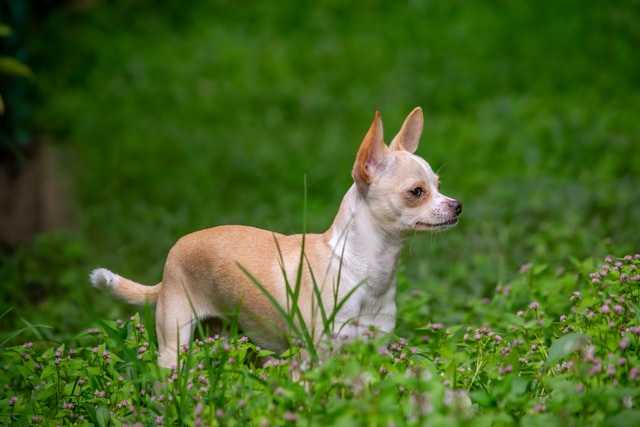
🔴Eye Issues
Few things have such a significant influence on your dog’s quality of life as healthy eye function. But, unfortunately, Chihuahuas can inherit or develop a variety of eye diseases, some of which will result in blindness if there is no action taken immediately, and the majority of which can be pretty painful.
🔴Knee Problems
Your Chihuahua’s kneecap may occasionally slide out of position. This is known as patellar luxation. You may notice that your pet suddenly lifts a back leg or skips and hops for a few paces while running. They may then kick their leg out sideways to reposition the kneecap. These are typical symptoms of patellar luxation. If the condition is minor and just affects one leg, your buddy may not need anything more than arthritis medicine.
🔴Tracheal Collapse
The trachea, or windpipe, is built up of cartilage rings that resemble the ridged hose of a vacuum cleaner. The trachea’s rigid structure gives both flexibility and strength. Unfortunately, these cartilage rings are occasionally weak or improperly developed in Chihuahuas. As a result, the trachea might collapse and constrict, causing coughing or trouble breathing.
🔴Liver Problems
Your Chi is more prone than other dogs to suffer portosystemic shunt, a liver disease. As a result, some of the blood flow that should be going to the liver instead flows around it, depriving the liver of the blood flow it requires to develop and operate correctly. If your Chihuahua has this, his liver will be unable to eliminate poisons from his circulation properly.
🔴Reproductive Difficulties
Breeds with a big head and a tiny pelvis are more prone to delivery complications. In addition, the female’s pelvis may be too narrow to accommodate the puppies’ heads, necessitating a C-section for her and her puppies’ health.
🔴Neurologic Problems
Chihuahuas can suffer from a variety of neurologic disorders. Seizures, instability, tremors, weakness, and excessive sleeping are all symptoms of neurological disorders. The particular problems we will be monitoring will be included on the health care chart included in this care guide.
🔴Heart Disease
A heart failure is the primary cause of mortality in senior Chihuahuas. The majority of heart illness in dogs is caused by the gradual weakening or distortion of heart valves, causing them to shut firmly no longer; blood then seeps back around these weaker valves, straining the heart.
🔴Hip Necrosis
Young Chihuahuas may be predisposed to Legg-Calve-Perthes disease, a painful degenerative hip ailment. The cause of this specific illness is still unknown, although it is caused by a decreased blood flow to the hip, causing the femoral head to become brittle and shatter readily.
🔴Bleeding Disorders
Your Chihuahua is predisposed to hemophilia, a blood condition. Therefore, before doing surgery, we will undertake diagnostic testing to determine his blood clotting time. This is a critical test since we may not know whether your pet has hemophilia till significant bleeding happens after surgery or after a catastrophic accident.
🔴Kidney Stones
Several types of stones can form in the kidney or bladder, and Chihuahuas are more susceptible than other breeds to develop them.
🔴Retained Puppy Teeth
Dogs often begin to lose their main teeth at the age of four months. Infection or damage to the adult teeth may develop if the primary teeth do not fall out when the adult teeth emerge. In addition, retained puppy teeth press oncoming adult teeth and trap food and hair between them, causing cavities and infections.
🔴Low Blood Sugar
Low blood sugar is a typical problem in young, small-breed dogs such as your Chihuahua. Weakness, collapse, and seizures are all symptoms of hypoglycemia. In addition, hypoglycemia can develop as a result of exercise, excitement, or skipping a meal.
🔴Spinal Cord Injuries
Chihuahuas are more prone to instability in the first two neck vertebrae than other breeds. This disease can result in severe spinal cord damage in the neck. If your dog becomes unable or reluctant to leap or walk upstairs, if they scream for no apparent reason, or if they try to turn or lower their head when you pick them up, they are in severe pain, and you should contact your veterinarian immediately.
🔴Water on the Brain
When fluid accumulates inside the skull, it puts pressure on the brain, resulting in hydrocephalus. This is especially prevalent in breeds with dome-shaped heads, such as your Chihuahua. Hydrocephalus is most commonly caused when the skull bones fail to join correctly after birth. Seizures, impaired mental function, spinning, and a spastic stride are all symptoms of hydrocephalus.
Chihuahua Care Instructions

Chihuahuas are the world’s tiniest canine breed. This little breed has unique requirements, which is why you need these Chihuahua skills.
✔️Dog Toys
Chihuahuas are inherently more hyperactive than other dog breeds. So make sure they have plenty of dog toys to play with and chew on. Otherwise, they will chew on non-dog-friendly objects like your beloved shoes or rugs.
✔️Clothing
It is more than simply a fashion statement. Chihuahuas do not tolerate cold temperatures well. So if it’s chilly outside, please put a jacket or sweater on your Chihuahua.
✔️Clean Floors
Chihuahuas are little, which implies they have small stomachs. Therefore, it is critical to maintaining your flooring free of anything that might suffocate or damage them.
✔️Get a Harness
Chihuahuas have extremely sensitive necks. You should not walk them with a collar on since it might cause damage. Purchase a walking harness and you will be amazed at how much your Chihuahua will be with a harness on.
✔️Prevent Flea and Tick
Chihuahuas are inside dogs, but that doesn’t mean they don’t require flea and tick prevention. They continue to go outside and on walks, which exposes them to creepy crawlies. Also, because of their tiny stature, they might have adverse reactions to medicines.
✔️Training is Must
It is critical to teach your Chihuahua like you would any other dog. Finally, they will recognize who is in control and will pay attention to you. After that, you can leave them alone at home for a few hours because you know they’ll know what to do.
✔️Enjoy your Time with Them
Take the time to enjoy your Chihuahua daily. There are so many enjoyable activities you can perform with them. Chihuahuas are such a delight and add so much joy to our lives.
The Drawbacks of Owning a Chihuahua
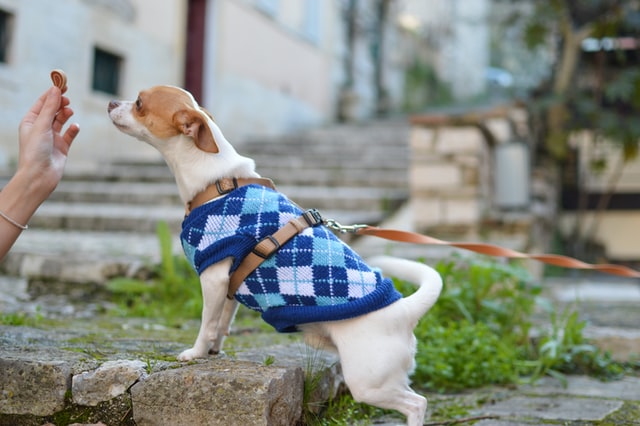
👎They are Fragile
The Chihuahua is a small, frail dog that is easily damaged. They can injure themselves even while falling from a couch; therefore particular precautions must be taken.
👎They Tend to Bond with One Person only
Chihuahuas are typically not family dogs since they are unable to form bonds with the entire family. They can bite if they feel threatened, scared, or uncomfortable. However, if a Chihuahua is raised and socialized from a young age, they make lovely pets.
Children may be unable to care for the frail dog. Harsh and straightforward treatment might easily injure him. Most Chihuahuas do not get along with small children because they are afraid of being injured. Therefore, Chihuahuas should be handled with caution.
👎They are Very Sensitive
Their skeleton is frail and slender. Avoid allowing your Chihuahua to participate in high-impact workouts. With frequent health exams, these diseases are simple to manage. However, they demand a great deal of attention and care for their health.
👎They get Cold Often
Chihuahuas struggle to live in cold temperatures. They prefer warm weather. If you are going out in the cold with them, you must dress them appropriately.
👎They Bark a Lot
If you live in an area where stillness is essential, Chihuahuas are not the greatest pet to have. If your house’s walls are not thick enough, the barking sound will travel outside.
Chihuahuas are highly picky about their territory and living environment. They do not adjust easily to changes in location. You can teach them how to overcome this obstacle.
👎They Do not Get along with other Animals
While playing, other dogs may injure them. If another dog snaps, it may be fatal for them. As a result, Chihuahuas have a preference towards fellow Chihuahuas. There are exceptions and some Chihuahuas do get along well with other pets.
They are prone to eye damage, so think twice about bringing a cat home.
Foods/Drinks to Avoid Feeding Your Chihuahua

Just because humans can eat something doesn’t imply a Chihuahua can. Many typical meals that are healthy for humans might cause serious disease in a Chihuahua.
❌Caffeine
The caffeine is one of the world’s most popular beverages, however, if you start your day with a hot cup of coffee, keep it away from your Chihuahua. Like many other common foods and beverages, coffee includes caffeine, a crystalline purine stimulant that is harmful to dogs.
❌Fruit Seeds
Certain fruits’ seeds, cores, and pits contain cyanide, which is extremely poisonous to dogs. Apricot pits, apple seeds, cherry seeds, peach pits, plum pits, nectarine pits, and apricot pits are included. The fleshy part of the apple is usually safe; owners must keep the seeds and pits away from their Chihuahuas.
❌Grapes and Dried Grapes
Grapes and raisins are extremely poisonous to dogs. When consumed, they can cause kidney damage, resulting in acute renal failure. However, the specific chemical that causes grapes and raisins to be poisonous to dogs is unclear.
❌Onions
Onions, like garlic, contain thiosulfate, which dogs are unable to digest due to a lack of enzymes. It also contain organosulfur chemicals, converted into oxidative molecules in Chihuahuas that damage red blood cells.
❌Nutmeg
Nutmeg is a culinary spice grown in Asia and the western Pacific from the tropical evergreen tree Myristica. While people may take low-to-moderate amounts of nutmeg without harm, dogs cannot. This is because Chihuahuas and other dogs are extremely susceptible to the neurotoxic myristicin found in nutmeg.
❌Alcohol
Dogs are extremely poisonous to alcohol. It depresses the central nervous system of a Chihuahua and the respiratory system while causing damage to the heart, kidneys, and liver.
❌Chocolate
When a Chihuahua consumes it, it causes the release of norepinephrine and epinephrine, which causes cardiovascular issues like increased heart rate and arrhythmias. In addition, caffeine and theobromine, two methylxanthine compounds found in chocolate, are hazardous to dogs.
❌Garlic
Garlic is very poisonous to dogs, despite its use as a homeopathic flea cure. Therefore, garlic and garlic-containing items should be kept out of the reach of your Chihuahua, whether raw, cooked, or powdered.
❌Hops
Hops is a key flavor and stabilizing ingredient used in beer production. Homebrewers should keep hops out of reach of their Chihuahuas, whether fresh, dried, spent, or pellets. Chihuahuas who consume hops may exhibit a variety of negative effects.
❌Macadamia Nuts
Not all nuts are dangerous, the exception to this rule is macadamia nuts, which are poisonous to Chihuahuas. In addition, they contain an unidentified toxin that is harmful to dogs. The good news is that most macadamia nut poisonings in dogs are minor, with canines usually recovering within 48 hours.
❌Xylitol
Sugar replacement xylitol is widely found in sugar-free gum, mints, confectionery, and peanut butter. It is frequently chosen over table sugar since it has less calories and a lower glycemic index. Unfortunately, in dogs, xylitol is absorbed more quickly, resulting in a hazardous insulin surge.
Chihuahua Hygiene and Grooming
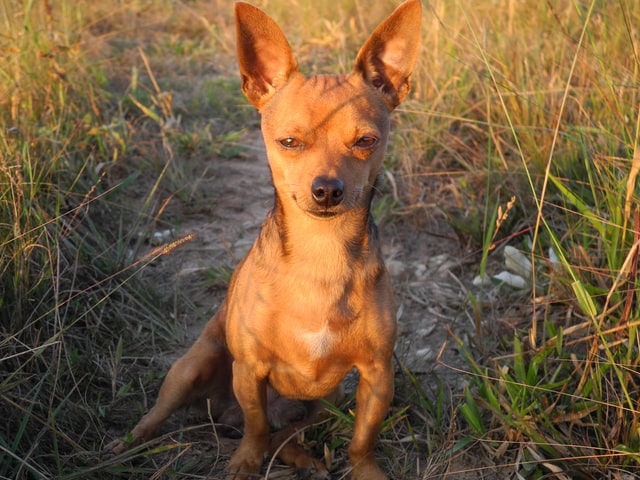
🐾Bubbly Baths
Remember to wash your Chihuahua at least once a week. This not only lowers shedding but also minimizes the likelihood of your dog getting tiny insects such as fleas or lice.
🐾Brush those Teeth
Brush your dog’s teeth regularly. Otherwise, germs can build up in your Chihuahua’s mouth, resulting in foul breath or more serious problems like gingivitis. These bacteria have the potential to cause abscesses, dental decay, and loose teeth. In addition, your dog’s jawbone may be harmed if he does not practice excellent oral hygiene.
🐾Shedding Season
Chihuahuas, like every other breed of dog, shed. Therefore, it would be preferable if you thoroughly groomed your Chihuahua. Otherwise, they will spit all over your place. That isn’t going to be a pretty sight; therefore daily coat brushing is advised.
🐾Trim those Nails
Since the Chihuahua’s nails grow quickly, you may need to clip them every quarter or so. To make this process easier, get a nail trimmer or a grinder.
Frequently Asked Questions
Q: Can All Dogs Have Allergies?
A: Yes, every dog is different, and dogs can be allergic to a wide range of items.
Q: Do Chihuahuas suffer from seasonal allergies?
A: Allergies. Allergies to pollen, mildew, or dust cause people to sneeze. Allergies cause itchy skin in dogs rather than sneezing.
Q: How can I tell if my Chihuahua is allergic to something?
A: Scratching/itching skin, licking (particularly the paws), and facial rubbing are common signs.
Q: Can chihuahuas eat scrambled eggs?
A: Eggs are entirely safe for dogs, and they are an excellent source of nourishment for your canine buddy.
Q: Why do Chihuahuas tremble?
A: One of the most prevalent causes of these canines’ shivering is that they are chilly.
Q: Is wheat an allergen in dogs?
A: Grains do not induce allergic reactions.
Final Thoughts
Chihuahuas are entertaining pets to have around. However, like any other dog, they have their own set of requirements that must be met. If you’re thinking about getting a Chihuahua, you now have all the knowledge you need to care for these pocket-sized pups. Knowing what they are allergic to will give you an advantage while caring for them.
Does your Chihuahua snore? Click here to know the reasons why. For more information about the breed, click here.
Was this article helpful? Please let us know in the comment section.
Here at ILoveChihuahua, we share our personal experiences as owners of this feisty breed. We talk about recommended methods, dog supplies picks, and advice on common Chihuahua problems. Our goal is to promote responsible dog ownership, so there would be fewer Chihuahuas in shelters.


